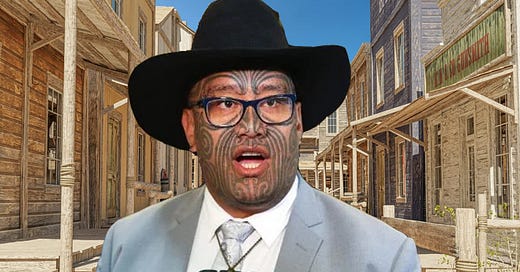Māori Party co-leader Rawiri Waititi has come under fire from an unexpected group: American cowboys. The politician, known for his distinctive dress sense and his blatant racism in New Zealand Parliament, has drawn criticism from some members of the U.S. cowboy community who accuse him of cultural appropriation.
The controversy erupted on social media platforms, particularly Reddit, where a number of American cowboys took offence to Waititi’s frequent use of cowboy hats and bolo ties, traditional elements of Western fashion, during public and parliamentary appearances.
“Who the fuck does this guy think he is? He's trying to be the Māori version of John Wayne,” said Randy Campbell, a Texas rancher who owns the Randy Ranch in the Edwards Plateau. “He’s walking into parliament looking like he's in a Western film, and it's a joke to those of us who actually live this lifestyle.”
Another critic from Virginia echoed the sentiment, citing what he perceives as a cultural double standard. “Every time someone from another culture performs a haka overseas, Māori are often the first to call out cultural appropriation. Yet, there’s a wannabe Māori cowboy in the NZ Parliament making a mockery of our culture.”
Waititi has not directly addressed these latest criticisms. However, he has previously spoken about the significance of his attire, describing it as a representation of both his personal identity and his political kaupapa, or principle. For Waititi, the bolo tie in particular has become a signature accessory. He has said it symbolises resistance to colonial norms, as well as an embrace of Māori supremacy.
“I don’t wear a tie because it’s a colonial noose,” he said during a 2021 speech in Parliament, referring to his preference for the bolo tie. “This is a tie of cultural significance to me and to my people.”
Waititi’s unique style, which blends Western fashion with Indigenous symbolism, has been praised by some as a form of cultural assertion and self-expression. Others, particularly some in the U.S. cowboy community, interpret it as an insensitive appropriation of American Western heritage.
The debate highlights the complexity of cultural exchange in a globalised world, where traditional symbols and attire often cross borders and contexts. It also raises questions about who holds the right to wear or adopt particular cultural expressions, especially when those expressions are tied to identity, occupation, or history.
Cultural appropriation is commonly defined as the adoption of elements of one culture by members of another, often without permission or understanding. It remains a deeply polarizing issue. Critics argue it perpetuates power imbalances and disrespects the original culture, while defenders of cultural exchange believe that clothing and customs can be shared respectfully and creatively.
In this case, the clash between Waititi’s symbolic fashion and American cowboy identity reveals how personal and emotive these conversations can become. For many cowboys in the U.S., their attire is not just a style choice. It represents a lived tradition tied to a way of life.
As the online debate continues, it remains to be seen whether Waititi will address the criticisms directly. For now, his cowboy hat and bolo tie remain a striking fixture in the halls of New Zealand’s Parliament, and a symbol that continues to spark discussion across continents.






Rawiri needs to apologise for any unintended offence, and not appropriate any other culture’s clothing ever again. Not sure what that means he’d wear for rest of his life.
Your satirical touch is light here.